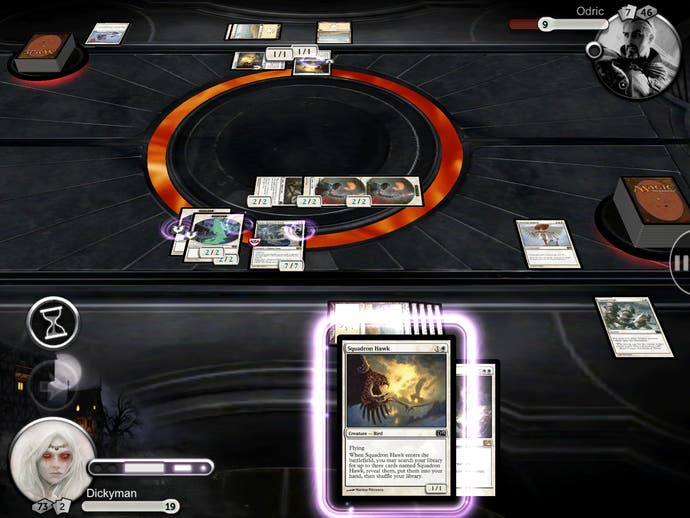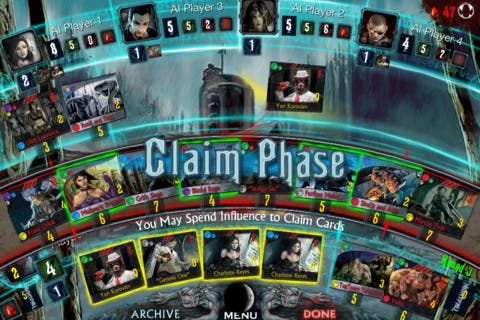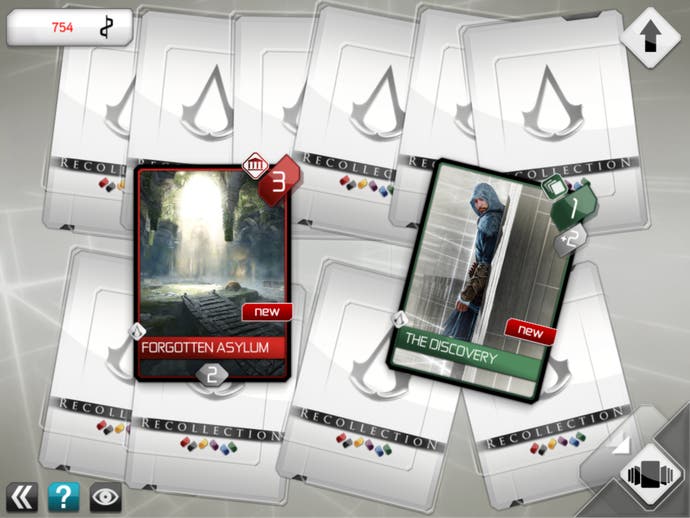Trading Host: Are Tablets Transforming Card Games?
Rich Stanton investigates the magic of card trading games.
When I was a teenager I did all sorts of terrible things, from buying Ant and Dec albums to nicking my dad's whiskey. I especially regret the fact that, despite loving chess and spending all my time playing videogames, I regarded the guys who played trading card games as the biggest dorks in the playground. Man, they got a hard time at school.
I was converted by a chum well into my 20s, and the only reason it took so long was this stupid perception. It's a regret because my entire life is spent playing games, and stuff like Magic is of the very best type. In a long arc that encompasses everything from Starcraft 2 to Small World, the strategy genre has room for everything - and one of its most glorious antechambers is the trading card game.
There are two things to acknowledge about card games like this, and they're kind of linked: one is that the rules are often complex, and the other is you have to learn how to physically play the game. Magic is relatively simple next to some of its successors, but even there you're dealing with buff counters, the differences between sorceries and instants, 'tapping' cards, etc. It is a big deal for new players, and even as a fairly regular one you forget stuff.

I've played more Magic on PC than in person - the automation of its rules certainly helps, but it's probably more to do with the hassle of actually arranging a match. It certainly pulled me into the genre, and I've kept on playing, but in the last eight months I've suddenly gone crazy for trading card games, and it's down to one thing: the tablet. I use an iPad, but any tablet is the perfect fit for card games for all sorts of reasons: the physical manipulation of a touchscreen, the automation of the maths, and the size of the screen itself.
Beyond even this there's the game concept itself: digital card games are free of the physical restrictions of cards in your hands, and a tablet's form factor lends itself to playing with this. The App Store hosts plenty of them, from Sega's Samurai Bloodshow to the likes of Playdek's Ascension and Nightfall.
The two best examples are extremes - Magic The Gathering, in the form of Duels of the Planeswalkers 2013 [https://www.eurogamer.net/articles/2012-06-21-magic-the-gathering-duels-of-the-planeswalkers-2013-review ], and Assassin's Creed Recollection [https://www.eurogamer.net/articles/2012-03-27-app-of-the-day-assassins-creed-recollection ]. Magic is the original trading card game and still the dominant force, with even the best alternatives taking its rules as their foundations. It's been around for twenty years now, and is without a doubt the king of the genre. How big? Adam Dixon, brand manager for Magic: The Gathering, has us covered: "Magic is available in 11 languages and 70 countries worldwide, we have a fanbase of around 12 million and growing. At the moment Magic is at the height of its popularity."
Magic's interesting because it's the biggest trading card game around, and has just made its tablet debut. Recollection, on the other hand, is an upstart released last November by Ubisoft, and is by a distance the best example of the genre being designed around the tablet platform.
Where Duels 2013 translates a real-world card game into a videogame, Recollection is a videogame. This is most obvious in its real-time structure - most card games are turn-based, because time is simply too complex a mechanic to introduce without some degree of automation. There are examples like Space Alert that work around time mechanics, but these use it in a linear fashion (i.e. you only have X minutes to do something). The best way I can put it is that in Recollection, time is a continual drumbeat and the eventual finishing move.
"It can be an intimidating place, frankly too intimidating, we know we need to make Magic Online much more user-friendly, but that said it's still the top of the pyramid if you will."

"The real-time aspect of the game was there from the beginning," says Marc Hernandez, Recollection's lead designer. "The actual terminology and night/day metaphor came later though. We wanted to use the specific abilities of videogames in a way that no board game could ever match." So Recollection takes place over that day and night cycle, speeding up and slowing down according to the player's circumstances. It's used in a brilliantly subtle way at times, such as at the end of long games when the speed increases and decreases in response to the cards being played - for example, if both players are waiting for cards to resolve, with no further actions possible, it'll zoom through the 'waiting' time and brake slightly afterwards.
Much of ACR's basic design is drawn from Magic: its combat is more or less identical, and many 'spells' are familiar. "I was looking for a fine balance between innovation and well-known mechanics of the genre," says Hernandez. "It didn't take that much iteration to come up with a version close to the game you can play now, and the main evolution was adding a feature: the whole Site mechanic came up late in the development, while I was looking for an alternate winning condition."
I could write an essay on how sites work, but the point is that as with everything in ACR their function is elegant, polished, and near-impossible to replicate on a tabletop. Because what ACR really impresses with is not just the excellent game at its core, but the long-term structure around it that takes advantage of a connected device's capabilities. Any card game offers multiplayer, but features like a deck builder with cloud saves or a marketplace are unique. It's a real piece of work, and in terms of card games designed specifically for tablet is in a league of its own.
Hernandez distances ACR from its clear inspiration, insisting that the design distinguishes it from games that still have their roots in physical play. "Magic 2013 certainly uses similar mechanics, but the general structure is radically different. It focuses more on card play while Recollection has more opportunity for players to express their own strategies and style. But I'm sure that Magic will drive new players to the platform which can only be positive for the genre itself."
That last part is perhaps truer the other way around: the tablet platform driving new players to the games. That's certainly what the folks behind Magic's digital form think. Worth Wollpert is director of digital publishing and gaming at Magic-maker Wizards of the Coast, and points out that the audience for card games and videogames don't always crossover.

"With things like XBLA and Steam and PSN, that's a pretty qualified type of customer, and with iPad - I mean, my mom uses the app store," says Wollpert. "All of our moms probably use the app store, but they're not floating around on XBLA looking at games. You're kind of confining yourself to gamers if you're on those services, but we also want to find people who at least have some proclivity towards strategy games, and maybe find some people who are Magic fans that just don't know it yet. Some of those people hang out on XBLA, but more of them hang out on the app store."
There is a wider point here about Magic, which is that Duels 2013 is only a small part of a much bigger whole, whereas something like ACR is self-contained. "One of the things we're trying to do here," says Wollpert. "and we've had a little bit of success with this, is use our digital and analogue presence together and drive people to those brick-and-mortar shops across the world, we have this very strong retail network that's kind of the endgame for Magic players."
Duels 2013 is perhaps Magic's best videogame translation yet, picking up a fat 9/10 [https://www.eurogamer.net/articles/2012-06-21-magic-the-gathering-duels-of-the-planeswalkers-2013-review ] on release, and though it lacks the fluidity of Recollection it sets a high bar for the game on tablets. "It took us a while to get it on there because we wanted to make sure it was something that felt really good on the iPad, like it was meant to be there" says Wollpert. "I like to think if someone downloaded Duels they wouldn't know it had been a game on other formats before."
And it turns out lots of people did download Duels. "The success of the iPad version has topped everyone's expectations this year," says Wollpert. "We knew it would get wide reach but the numbers that are coming back are mind-blowing. We knew the conversion would probably be less than on XBLA or PSN, but to be honest it hasn't been that much less. It's been a huge success on iPad, so we'll definitely be back."

That begs a question. Presuming that tablets don't suddenly disappear, and with the quality of competition offered by the likes of ACR, how important are tablets to Magic's future? Will future rule changes take account of the possibilities offered by digital play? Or is Magic always going to put the physical game first?
"I think always is way too strong a word," says Wollpert. "I mean our R&D is always looking at what we can do with new platforms. I personally agree with you - we can't go back, the genie's out of the bottle - but I'm biased because digital is my whole world now. It's not going to be stuff like rule changes that come down the pipeline in the immediate future, it's more about taking advantage of specific platforms without harming the overall Magic experience. Obviously I can't get into specifics, but I always think about the difference between playing chess on a board, and battle chess. I think there's something in-between that makes a lot of sense." No-one mention Eye of Judgement. In the meantime, there are expansions down the line for Duels 2013, and Recollection has just had its first, based on Assassin's Creed Revelations. "So far we've been really happy with the reception of the game," says Hernandez. "I'm not entirely sure the market is mature enough yet, but the device is certainly the perfect fit."
The market's maturity is a difficult matter to proclaim on. While there are quality apps out there like Magic, Recollection, and Ascension (Playdek's finest by far, especially after a recent art update), it's true that these are the early days of a new platform. Tablets may not be a new thing, but as a commercially viable platform for card games and videogames they are, and Recollection should be a trailblazer for more platform-specific design. "To me the iPad is a great think tank," says Hernandez "It has the most intuitive interactions but allows the most intricate design. In my opinion, it hasn't quite been accepted as a true gaming platform yet. But I'm absolutely certain that it won't take long."

